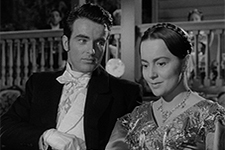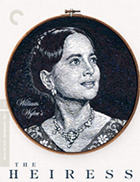The Heiress
|  William Wyler’s The Heiress is an exemplar of ambiguous storytelling—perhaps one of the greatest in all of classical Hollywood cinema. The shades of gray that color every character and every major plot point turn its drama about romance and social hierarchies in 19th-century New York City into an enigmatic portrait of the fundamental unknowability of those around us, which was also the central theme of Orson Welles’s Citizen Kane (1941). Like Kane, The Heiress, which was based on the popular Broadway play of the same title by Ruth and Augustus Goetz that was based on Henry James’s novel 1880 Washington Square, is built around a titular protagonist who seems transparent enough, but as the film progresses becomes more and more opaque, partially because of her experiences with those around her whose intentions are often muddied by subterfuge and deceit.. Olivia de Havilland won the second of her two Oscars playing the heiress of the title, a shy wallflower named Catherine Sloper. Catherine is the only daughter of Dr. Austin Sloper (Ralph Richardson), a wealthy and highly respected surgeon who sits atop the social hierarchy of the tony Washington Square Park district. A widower who reveres his dead wife, Dr. Sloper can’t help but see Catherine as a constant disappointment, a plain young woman of awkward social disposition who fails time and time again to live up to his (possibly idealized) memory of her mother. Dr. Sloper’s erudite speech and refined manners can’t completely mask his contempt for his daughter, which we see almost immediately when she tries to impress him by wearing one her mother’s dresses, only to be coolly informed about how she is dominated by the cherry red color, rather than dominating it as her mother would have. Despite her social awkwardness, Catherine catches the eye and attention of a handsome young bachelor named Morris Townsend (Montgomery Clift) at a party. He begins to court her, much to her surprise and much to her father’s consternation. You see, Morris has no money to his name and has squandered a small inheritance living in Europe, so Dr. Sloper suspects that his interest in Catherine is purely economic. Catherine is convinced that Morris loves her and wants to marry her for love, which puts her fundamentally at odds with her stern father, who refuses to accept Morris as anything more than a charlatan who wants his daughter’s inheritance. Thus, the film’s central question revolves around Morris’s true nature: Is he genuinely in love with Catherine, as she so ardently believes him to be, or he is the canny opportunist Dr. Sloper suspects? Because Morris is charming and gracious and is played by the almost impossibly handsome Montgomery Clift at the height of his stardom, we want to believe that he is sincere, but there are little hints that his motives may not be all that honorable. Because Dr. Sloper is played by Ralph Richardson as self-important and casually cruel, we are drawn to believe that his suspicions are fueled primarily by jealousy over his daughter and the condescending, upper-crust belief that only men of wealth could be worthy of her hand. Yet, much of what he says has an undeniable logic, and even if it comes from a place of malice and control, he might very well be right. A little more than halfway through the film we learn what Morris’s intentions truly are—or do we? The events taking us into the film’s second half have a profound effect on Catherine, turning her from the mousy wallflower with no voice of her own into a powerful woman who seeks to take control of her own life, which until now has been dominated by men, both her supercilious father and the dream-laden prospect of a future husband embodied in Morriss. The manner in which Olivia de Havilland alters everything about Catherine—from the way she walks, to the way she does needlepoint, to the way she holds her eyes—gives The Heiress a powerful charge, the kind that comes only from witnessing a character go through a hitherto unimaginable transformation into something decidedly unfamiliar. The final shot of Catherine is the film’s real coup de grace, as it confirms everything we think we now know about Catherine while also forcing us to wonder whether she made the right decision about the future course of her life. The ambiguity doesn’t just follow all the way to the end, but intensifies, leaving us with far more questions than answers. The film’s dramatic power should come as a little surprise given that it was directd by William Wyler, one of the consummate geniuses of the classical Hollywood era, although the wide variety of films he made has often denied him the coveted label of auteur, Like many Hollywood filmmakers of his era, Wyler spent most of World War II working for the U.S. government as part of the war effort. An officer in the U.S. Army Air Corps, he produced numerous documentaries, including The Memphis Belle: A Story of a Flying Fortress (1944), which followed the famed bomber on its 25th and final mission over Germany (it cost him his hearing in one ear), and The Fighting Lady (1944), a film about life on an aircraft carrier that won the Best Documentary Oscar. His first film after the war was the classic The Best Years of Our Lives (1946), a drama about the difficulties faced by veterans returning to small-town life (it won seven Oscars, including Best Picture and Best Director for Wyler, the second of his eventual three statuettes). After a three-year absence, Wyler returned with The Heiress, a decidedly different film from the ones he had made immediately before, during, and after World War II, although his direct experiences witnessing and dramatizing combat feels embedded in every frame. Even though it is set in the genteel 19th-century world of wealth and privilege, it is a film fraught with the violence of animosity, disappointment, and manipulation, with characters constantly pitted against each other in a struggle for control. The film works so well because those surging emotional currents, although often pushed just below the surface, give it a constant tension that draws you in like a thriller. Catherine is one of the great screen characters of that era, a compelling woman whose loneliness makes her sympathetic and later vindictiveness makes her tragic. The Heiress is, if anything, a film about a victim who finally decides to be a victim no longer, although its most powerful twist is ensuring that we never know for sure what the cost of that transformation has been.
Copyright © 2019 James Kendrick Thoughts? E-mail James Kendrick All images copyright © The Criterion Collection | |||||||||||||||||||||||||||||||
Overall Rating: 


 (4)
(4)


